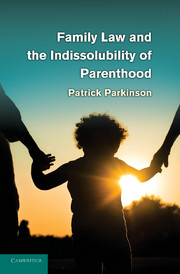Book contents
- Frontmatter
- Contents
- Preface
- PART ONE Family Law and the Meaning of Divorce
- PART TWO Parenthood in the Enduring Family
- PART THREE Parents Forever?
- PART FOUR The Family Law System and the Enduring Family
- PART FIVE Financial Transfers in the Enduring Family
- PART SIX The Future of Family Law
- 12 Between Two Conflicting Views of Separation and Divorce
- Index
- References
12 - Between Two Conflicting Views of Separation and Divorce
Published online by Cambridge University Press: 01 March 2011
- Frontmatter
- Contents
- Preface
- PART ONE Family Law and the Meaning of Divorce
- PART TWO Parenthood in the Enduring Family
- PART THREE Parents Forever?
- PART FOUR The Family Law System and the Enduring Family
- PART FIVE Financial Transfers in the Enduring Family
- PART SIX The Future of Family Law
- 12 Between Two Conflicting Views of Separation and Divorce
- Index
- References
Summary
ABANDONING THE JUDEO-CHRISTIAN VIEW OF MARRIAGE
Thousands of years ago – so the story is told in the first book of Kings – Elijah stood on Mount Carmel and challenged his people as to which beliefs they would maintain, which deity they would follow. “How long will you waver between two opinions?” he asked. “If the Lord is God, follow him; but if Baal is God, follow him.”
Western societies have rather decisively cast off their Christian heritage when it comes to family life. The no-fault divorce revolution was just one of many social changes concerning marriage, family, and sexuality that occurred from the 1960s onward. The notion that marriage was, at least in principle, a lifelong commitment has given way to a practice of free terminability in many, but not all, western countries. Marriage is also just one choice of partnering now; many people choose to live together without marrying either as a life-stage on the way to marriage (perhaps with that partner, perhaps with another) or as an alternative to marriage. Same-sex relationships are recognized in various ways in many jurisdictions, some granting the right to marry, others giving legal effect to same-sex relationships through registered partnerships or civil unions. A plurality of forms of legal recognition has emerged for domestic relationships. In the Netherlands, for example, both heterosexual couples and homosexual couples may enter into either marriages or registered partnerships with almost identical consequences, or live together without formal recognition. There is a smorgasbord of choice.
- Type
- Chapter
- Information
- Family Law and the Indissolubility of Parenthood , pp. 269 - 280Publisher: Cambridge University PressPrint publication year: 2011



